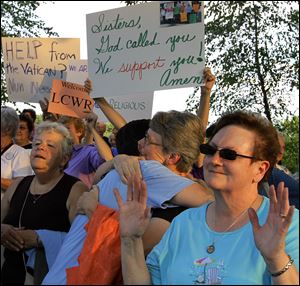
U.S. nuns group agrees to confer with bishops
8/11/2012
Supporters of the largest group for American nuns, the Leadership Conference of Women Religious, hold a vigil for them in St. Louis this week. The Vatican has rebuked the nuns, ordering them to reform.
ST. LOUIS -- A U.S. nuns group rebuked by the Vatican said Friday it would hold talks with bishops chosen to overhaul the organization but would not "compromise its mission."
Sister Pat Farrell, president of the Leadership Conference of Women Religious, called a Vatican assessment accusing the sisters of tolerating dissent a "misrepresentation." But she said the more than 900 women who attended the group's national assembly this week decided to stay open to discussion with three bishops the Vatican appointed to oversee them. "The officers will proceed with these discussions as long as possible but will reconsider if LCWR is forced to compromise the integrity of its mission," Sister Pat said. She declined to discuss specifics.
The group represents 80 percent of the nation's 57,000 Catholic nuns.
The St. Louis meeting was the group's first national gathering since a Vatican review concluded the sisters had "serious doctrinal problems" and promoted "certain radical feminist themes" that undermine Catholic teaching on the all-male priesthood, birth control, and homosexuality. The nuns were accused of staying nearly silent in the fight against abortion.
Sister Pat acknowledged the nuns' plan was vague but noted the process was to last five years and had only started. The board is expected to meet soon with Seattle Archbishop Peter Sartain, who will be in charge of the overhaul.
"Dialogue on doctrine is not going to be our starting point," Sister Pat said. "Our starting point will be about our own life and about our understanding of religious life, and the [Vatican] document's, in our view, misrepresentation of that, and we'll see how it unfolds from there."
The Vatican orthodoxy watchdog, the Congregation for the Doctrine of the Faith, undertook the assessment in 2008, after years of complaints from theological conservatives that the U.S. nuns' group had become secular and political while abandoning traditional faith.
The critique in April prompted a national outpouring of support for the sisters, including parish vigils, protests outside the Vatican embassy in Washington, and a congressional resolution commending them for their service to the country.
After the Second Vatican Council of the '60s, many sisters shed their habits and traditional roles as they sought to more fully engage the modern world. The nuns said prayer and Christ stayed central to their work as they focused more on social justice teaching, such as fighting poverty and advocating for civil rights.
Vatican investigators have praised the nuns' humanitarian work, but said the group has "serious doctrinal problems." Archbishop Sartain is to oversee a full-scale reform of the group, including rewriting its statutes, reviewing plans and programs, approving assembly speakers, and ensuring it follows Catholic ritual.
One part of the Vatican censure focused on the speakers the nuns chose for annual meetings. The keynote address this year was from a woman who described herself as a futurist who leads a movement called "conscious evolution."
Bishop Leonard Blair of Toledo, who led the doctrinal review, has said "there's been a lot of just denial" by the group about its problems. In a National Public Radio interview, he said no "middle ground" exists on core church teaching.